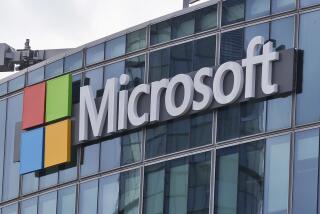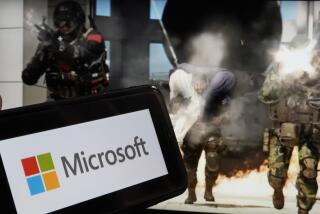Microsoft says no to Activision merger without ‘Call of Duty’

- Share via
Microsoft made it clear on Tuesday that there will be no $69-billion deal to buy Activision Blizzard unless it comes with the blockbuster title “Call of Duty.”
Less than two weeks ago, Britain’s antitrust watchdog suggested that Microsoft may need to divest “Call of Duty” — one of the most lucrative game franchises in the world — to assuage concerns about its Activision Blizzard takeover being harmful for gaming market competition. Microsoft President Brad Smith told reporters after a closed-door hearing in Brussels with European Union regulators that it isn’t “feasible or realistic to think that one game or one slice of this company can be carved out and separated from the rest” as part of the acquisition.
Antitrust regulators have a choice, he said: Block the deal or “let the future go forward with behavioral guardrails and remedies and bring this title to 150 million more people.”
That said, Smith struck an optimistic tone Tuesday after a daylong meeting defending the controversial deal. He said pacts struck with Nintendo and Nvidia to share the game with their platforms meant that as many as 150 million more people would get access to it if the Activision deal is approved.
Microsoft’s proposed Activision Blizzard deal is the company’s largest ever and one of the 30 biggest acquisitions of all time. Aside from “Call of Duty,” antitrust regulators are concerned about Microsoft’s leading position in cloud gaming.
The technology is still in its early days, but Microsoft is ahead of the pack with its Xbox Game Pass subscription service, which offers a library of more than 300 titles for about $10 a month for gamers who want to download games to play on the Xbox or PC. A higher tier of the subscription, at $15 a month, includes cloud gaming, which enables subscribers to stream certain games onto any device, even tablets and phones.
Activision Blizzard has been stuck in a ‘Call of Duty’ rut. How Microsoft could shake things up.
By bringing Activision titles such as “Candy Crush” and “Call of Duty” under its roof, Microsoft is betting that it will be able to offer more games to its Game Pass subscribers. While Tuesday’s hearing focuses on the EU’s concerns, authorities in the U.S. and the U.K. have all started procedures that could potentially block the deal, amid concerns that Microsoft will take an early lead in the cloud by adding Activision’s games, eventually making them all exclusive to its own platforms.
Britain’s Competition and Markets Authority presents possibly the biggest hurdle yet, after the agency earlier this month suggested a number of structural remedies, including the divestiture of the business associated with “Call of Duty,” the Activision part of the business or blocking the merger altogether. Microsoft and other interested parties have until Wednesday to respond to the authority’s provisional findings. A hearing to discuss potential remedies will take place in London later this month.
“If we can address these issues in Brussels, if we can sort through things in London, I’m optimistic that we’ll advance from Washington, D.C., as well,” Smith said in an interview on Bloomberg TV.
Earlier Tuesday, Smith said the company was “more than willing, given our strategy, to address the concerns that others have, whether it’s by contracts, like we did with Nintendo this morning, or whether it’s by regulatory undertakings, as we’ve consistently been open to addressing.”
He was referring to the signing of a 10-year agreement with Nintendo that “will bring ‘Call of Duty’ to Nintendo devices.” Microsoft last year already publicly offered to give rival Sony Group Corp. a similar license for the blockbuster game.
Smith used the news conference to implore Sony to agree to the pact in order to bring the games to a wider audience. He said he was ready to “pull out a pen” for Sony to sign one as he brandished on stage what he said was the actual agreement. Sony didn’t immediately respond to a request for comment.
Microsoft recently received the EU regulators’ initial findings in a so-called statement of objections, or SO, laying out the bloc’s key concerns about the deal, according to people familiar with the review.
Together with the EU hearing, the SO will set the path for Microsoft to submit formal remedies in the coming weeks.
The EU aims to finalize its review by April 11, but the date could be pushed back still. The U.K. probe is set to conclude by April 26, while in the U.S., the Federal Trade Commission is locked in a potentially far longer process after formally suing to veto the transaction.
“Sony continues to deny the opportunity for a long-term agreement and is undermining the deal to protect its two-decade dominance in video games,” an Activision Blizzard spokesperson said.
Bloomberg staff writers Katharine Gemmell, Molly Schuetz, Dina Bass, Max Ramsay and Cecilia D’Anastasio contributed to this report.







